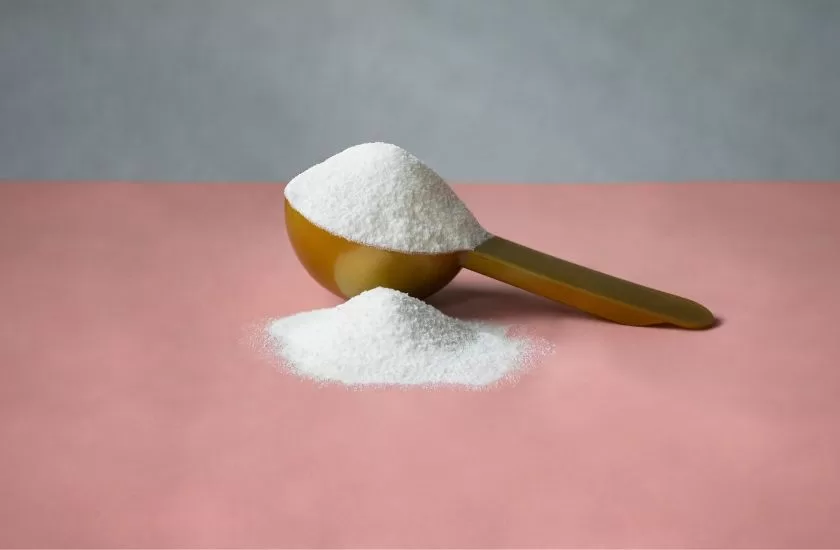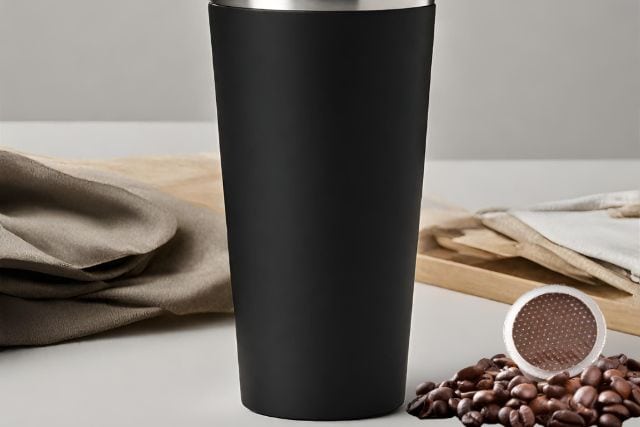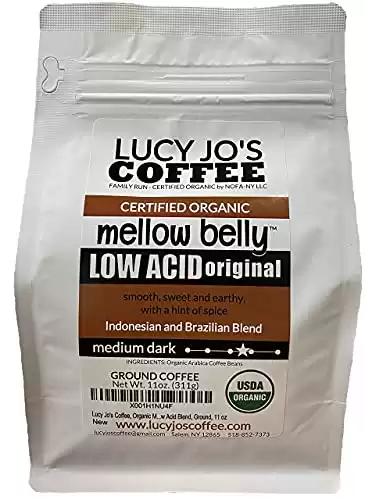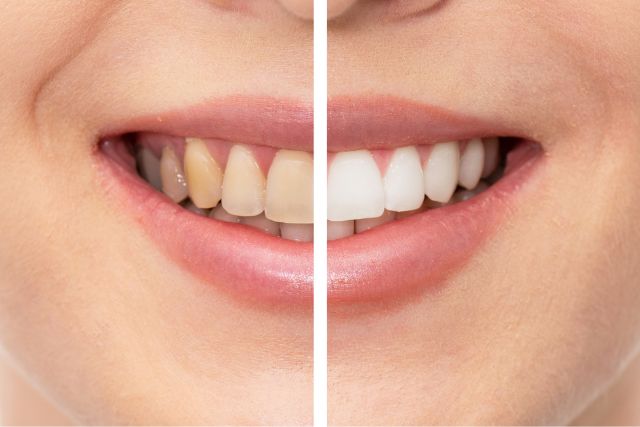5 Surprising Benefits Of Putting Baking Soda In Coffee
This post contains affiliate links, which means we receive a small commission on qualifying purchases. This does not impact your cost in any way. See details here.

Are you a coffee lover looking to enhance your morning brew?
Consider adding baking soda in coffee as an unexpected ingredient.
We explore the wonders of baking soda, its effects on coffee, and the surprising benefits it can bring to your daily cup of joe.
From reducing bitterness to boosting energy, adding baking soda to your coffee may revolutionize your morning routine.
Before you use baking soda, learn how to use it properly and be aware of possible risks.
What Exactly Is Baking Soda?
We’ve all seen that good ‘ol box of Arm & Hammer baking soda.
Many of us have used it in the fridge and/or freezer to absorb odors, but few know what it is.
Baking soda, also known as sodium bicarbonate, is a white crystalline powder that is commonly used in baking and cooking as a leavening agent.
Aside from its role in the culinary world, baking soda has a versatile range of applications extending beyond the kitchen. Its chemical composition, sodium bicarbonate, is derived from soda ash, a natural mineral that is processed into the familiar powder.
The alkaline nature of baking soda makes it an effective cleaner for various surfaces and materials, capable of cutting through grease and grime with ease. Many people use baking soda as a natural ingredient in their beauty routines, employing it in facial masks, hair care, and even as a gentle exfoliator.
Some individuals incorporate baking soda into their health practices, as it is believed to aid digestion and neutralize stomach acid due to its ability to interact with chlorogenic acid.
How Can Baking Soda Be Used?
Baking soda can be used in various ways, including as a household cleaner, deodorizer, and for personal care purposes.
Known for its multitasking properties, baking soda is a powerhouse ingredient that can tackle tough stains on clothing and surfaces with ease. Its abrasive nature makes it a gentle yet effective scrubbing agent for removing grime and dirt.
This versatile white powder is highly effective in freshening carpets by simply sprinkling it on and vacuuming it up after a few hours. Not only that, but baking soda is praised for its soothing properties, making it a common remedy for skin irritations like sunburns and insect bites.
OK, But Why Would I Put Baking Soda In Coffee?
When baking soda is added to coffee, it can have a significant impact on the taste, acidity, and overall drinking experience.
When baking soda comes into contact with the coffee’s acidity, a series of chemical reactions unfold. The alkaline nature of baking soda helps neutralize the acidity in coffee, leading to a smoother, less bitter taste that is preferred by many. This reaction can also reduce the perceived bitterness of coffee, making it more palatable for those with sensitive stomachs or acid reflux issues.
The interaction between baking soda and coffee can influence the release of certain compounds, altering the overall flavor profile. By mitigating the acidic bite, baking soda can unveil hidden flavor notes in coffee beans, enhancing the drinking experience for enthusiasts.

How Does Baking Soda In Coffee Affect the Taste?
The addition of baking soda in coffee can impact its taste by reducing bitterness, balancing acidity, and enhancing certain flavor notes.
When baking soda is introduced to coffee, it initiates a chemical reaction that alters the beverage’s sensory profile dramatically. The reduction in bitterness leads to a smoother drinking experience, making it more palatable for those sensitive to strong, harsh flavors.
As the acidity is balanced, the coffee may exhibit a rounder, more mellow taste, allowing for subtle nuances in the beans to shine through. The aroma profile also undergoes a transformation, with hints of caramelization and warmth becoming more pronounced.
Does Baking Soda Reduce Acidity in Coffee?
Baking soda has the ability to neutralize acidity in coffee, making it a potential solution for individuals sensitive to acidic beverages.
When baking soda is added to coffee, it reacts with the acids present, such as chlorogenic acids, which are responsible for the beverage’s perceived sharpness. This reaction results in a temporary reduction in the overall acidity of the coffee, making it smoother and less harsh on the palate.
For those with sensitive stomachs or digestive issues, this can be particularly beneficial as high acid content in beverages like coffee can aggravate conditions such as heartburn, acid reflux, or ulcers.
What Are The Benefits Of Putting Baking Soda In Coffee?
Adding baking soda in coffee offers several advantages, including reducing bitterness, balancing acidity, enhancing flavor, aiding digestion, and boosting energy levels.
Incorporating baking soda into your daily coffee routine can help in detoxifying the body by neutralizing acids and promoting a healthier pH balance. This simple yet effective technique can also reduce the overall caffeine intake in your cup, making it a favorable choice for those looking to moderate their daily caffeine consumption.
Reduces Bitterness
One of the key benefits of baking soda in coffee is its ability to reduce bitterness, resulting in a smoother and milder flavor profile.
When a coffee is brewed, various compounds present in the beans interact to create its unique taste profile. The level of roast, bean origin, and brewing method all play a role in determining the final flavor.
Sometimes the bitterness can overpower the other subtle notes, making the coffee less enjoyable for some palates.
That’s where the magic of baking soda comes in. By neutralizing the acidic compounds responsible for the bitter taste, baking soda alters the overall flavor composition, improving the drinking experience.
Balances Acidity
By balancing acidity levels, baking soda can make coffee gentler on the stomach and more suitable for individuals prone to acid reflux or digestive issues.
When coffee beans are roasted, they release natural acids that can be harsh on some digestive systems. The introduction of baking soda into the brewing process helps to neutralize these acids, creating a smoother, less acidic cup of coffee. This chemical reaction occurs because baking soda is alkaline, countering the acidity in the coffee. The result is a drink that is not only easier on the stomach but can also be kinder to teeth enamel.
It’s important to note that adding too much baking soda may alter the taste of the coffee, so it’s best to start with a small amount and adjust to personal preference. Consulting with a dietitian can provide personalized guidance on incorporating baking soda in coffee for those with specific health concerns such as acid reflux.
By understanding the science behind this simple kitchen ingredient, coffee lovers can enjoy their favorite brew without worrying about potential negative health impacts.
READ: Brewing Brilliance: How To Balance The Acidity Level Of Coffee Like A Pro
Enhances Flavor
The addition of baking soda to coffee can enhance its flavor profile by reducing bitterness and unveiling subtle nuances in the brew.
When added in small quantities, baking soda acts as a pH buffer, neutralizing the acidity present in coffee. This chemical reaction alters the overall taste composition by shifting the balance towards a smoother, less harsh flavor profile. The reduction in bitterness allows coffee enthusiasts to experience a more pronounced range of flavors that might have been previously overshadowed. This technique has gained popularity in the coffee community as an innovative way to explore the trend of specialty coffees and elevate the sensory experience.
READ: 15 Things You Should Try Right Now To Make Coffee Taste Better
Aids Digestion
In some cases, baking soda in coffee can aid digestion by neutralizing excess stomach acid and promoting smoother gastrointestinal function.
When consumed in moderation, baking soda-infused coffee has been suggested to help alleviate symptoms of acid reflux due to its ability to reduce acidity levels in the stomach.
This can be particularly beneficial for individuals suffering from ulcers, as baking soda is known for its soothing properties that may help calm stomach irritations and discomfort.
The alkaline nature of baking soda can potentially assist in balancing pH levels in the stomach, contributing to a healthier digestive environment overall.
Boosts Energy
The inclusion of baking soda in coffee may provide a subtle energy boost, thanks to its alkalizing effects and potential impact on metabolism.
When baking soda, a common household ingredient with alkaline properties, reacts with coffee, a caffeine-rich beverage, an interesting synergy occurs.
Caffeine is known for its stimulating effects on the central nervous system, which can help in improving alertness and focus. When combined with baking soda, the alkaline nature of the compound can potentially enhance caffeine’s metabolism-boosting properties.
This interaction may lead to a more sustained release of energy throughout the day, potentially helping individuals maintain higher energy levels for longer durations.
How Much Baking Soda Should Be Added To Coffee?
Determining the right amount of baking soda to add to coffee depends on personal preference, desired flavor adjustments, and individual tolerance levels.
Experimenting with different quantities of baking soda in your coffee can lead to varied outcomes in terms of taste and acidity. A pinch of baking soda can help reduce the bitterness of coffee, making it smoother on the palate while a larger quantity might introduce a slight saltiness. It’s essential to note that excessive usage of baking soda may alter the pH balance of the coffee, affecting its overall flavor profile.
In terms of potential health considerations, moderate consumption, within the guidelines set by the FDA, is recommended to avoid any adverse effects on your health.
Are There Any Risks of Putting Baking Soda in Coffee?
While adding baking soda to coffee can offer benefits, there are potential risks to consider, such as stomach upset and interactions with certain medications.
One of the common drawbacks of incorporating baking soda into your coffee routine is the possibility of experiencing digestive issues. Baking soda is alkaline in nature, and when consumed in excess, it can disrupt the natural pH balance of the stomach, leading to bloating, gas, and indigestion.
Individuals with sensitive stomachs or conditions like Irritable Bowel Syndrome (IBS) may find that baking soda exacerbates their symptoms, causing further discomfort and gastrointestinal distress.
In addition, it’s crucial to be cautious of the potential interactions between baking soda and certain medications. Baking soda can interfere with the absorption and effectiveness of medications, especially those for heart conditions or chronic illnesses.
Can Cause Stomach Upset
Less is more. Excessive consumption of baking soda in coffee may lead to stomach upset, bloating, and discomfort, especially for individuals with underlying digestive conditions.
When baking soda reacts with stomach acid, it can disrupt the natural pH balance, potentially triggering acid reflux or indigestion. This combination may also lead to gas and belching, causing further discomfort. It’s crucial to be cautious when using baking soda in coffee as a detox remedy, as the abrasive nature of this mixture can irritate the digestive lining, aggravating conditions like ulcers.
Experts suggest limiting the amount of baking soda added to coffee and avoiding this combination if you have a sensitive stomach or a history of gastrointestinal issues.
May Interact with Certain Medications
Baking soda in coffee can interact with specific medications, altering their absorption rates or effectiveness, so it is crucial to consult a healthcare professional if you have concerns.
Drug interactions related to combining baking soda with coffee can have notable impacts on various medications that an individual may be taking.
The FDA suggests that certain drugs like antibiotics, antacids, and medications used to treat hypertension and diabetes may be affected by the alkaline properties of baking soda. For example, medications like antacids or antibiotics may have their absorption rates altered when taken alongside baking soda-infused coffee.
Seeking medical advice before experimenting with this combination is highly recommended to avoid any potential risks or decreased effectiveness of medications.

How To Properly Add Baking Soda To Coffee?
To ensure the best results when adding baking soda to coffee, it is recommended to dissolve the powder in a small amount of water before mixing it into your brew.
This step is crucial as it helps to evenly distribute the baking soda throughout the coffee, preventing any clumping or uneven taste. Once the baking soda is dissolved, you can mix it into your cup of coffee using a spoon or stirrer. The ideal mixing ratio is usually around a quarter of a teaspoon of baking soda for every cup of coffee, but this can be adjusted based on personal preference.
Putting baking soda in coffee can help reduce its overall acidity, making it gentler on the stomach. Keep in mind that this may slightly alter the flavor profile of your coffee, so you may need to experiment to find the perfect balance for your taste buds.
Conclusion
The addition of baking soda to coffee can offer a range of effects on taste, acidity, digestion, and overall drinking experience, but it is essential to consider individual preferences and potential health considerations.
When considering the benefits, it’s important to note that a pinch of baking soda can help reduce the bitterness of coffee, making it more palatable for those sensitive to acidity. Incorporating baking soda into your coffee routine can lead to a smoother and more balanced flavor profile, especially when dealing with darker roasts that tend to have higher acidity levels like those from Grounds & Hounds Coffee Co.

Frequently Asked Questions
What are the 5 surprising benefits of putting baking soda in coffee?
There are several benefits of adding baking soda to your morning cup of coffee. The top 5 surprising benefits are: improved digestion, reduced bitterness, enhanced flavor, decreased acidity, and improved mood.
How does baking soda improve digestion when added to coffee?
Baking soda acts as a natural antacid and can help neutralize stomach acid to improve digestion. This can be especially beneficial for those who experience discomfort or heartburn after drinking coffee.
Will putting baking soda in coffee make it taste less bitter?
Yes, baking soda can help reduce the bitter taste of coffee by balancing out the acidity. This can result in a smoother and more enjoyable cup of coffee.
Can baking soda enhance the flavor of my coffee?
Absolutely! Baking soda can enhance the natural flavors of your coffee by neutralizing any acidic or bitter notes. This can make for a more balanced and delicious cup of coffee.
Will adding baking soda decrease the acidity of my coffee?
Yes, adding a small amount of baking soda to your coffee can help lower its acidity. This can be beneficial for those who have sensitive stomachs or are trying to reduce acid intake.
Can putting baking soda in coffee improve my mood?
The jury is still out, but some studies suggest that baking soda can have a positive effect on mood and mental clarity. Adding it to your coffee can help boost your overall mood and energy levels.






